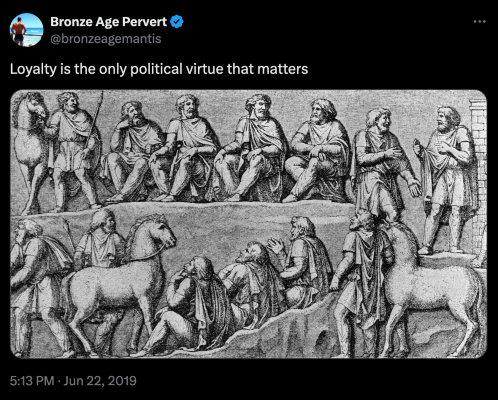The full two hour episode is available below.
First of all, thank you to Nathan for his time. Secondly, one thing that arises in this discussion is the difference between a Nietzschean and a Girardian conception of Christianity. Thirdly, Nathan was scheduled to speak with The California Review prior to a recent public refutation that he, in part, addressed here. While The Cal Review would like to avert any collateral damage in this twitter fight, we believe it may simply amount to Nathan and his interlocutor BAP's mutual fealty to Friedrich Nietzsche, which itself may benefit from a Girardian analysis, addressed below.
Everyone is afraid to approach Nietzsche and then timidly handles his words with kid gloves. This is especially the case for every teenage boy, Jew and goy alike, with a predilection toward philosophy. The first and most obvious reason not to reach for the lowest hanging fruit of Beyond Good and Evil or Geneology today, when there is plenty of less bitter Nietzsche on offer, is that these two works are taught in the academy. As has been pointed out, the great philologians have been painfully debased into dull tools in yet another example of the academic left's colonization of the corpus beyond recognition. They appropriate these classics in the unquestioning advancement of their own shrill and tone-deaf project. They gleefully drool over Geneology's influence on Foucault. Nietzsche is the source of the ubiquitous Plato-bashing in the academy and the worst of woke professors all take great pleasure in its parroting. He has a lot to offer but when attempting to consume the same material used to gavage leftists and children, caveat emptor. To the degree that one is less well-read than Friedrich (a lot) and is merely reacting to his aptitude for style (also probably a lot), you will likely not make your way past the crowds that have made these two works so overrated.
As Friedrich mentioned in at least three places in the ten years prior to his inflated period: ςοφος, etymologically, is not a quiet asceticism. It is related to the Latin sapio. That is, wisdom is good taste. It is a well-honed and mature aesthetic and ethical judgement. It is knowing where to look, whether that be outside of academic journals like Nathan or eating figs and parm in Tokyo or whatever it is that BAP does. I personally would like to sample an argument that the entire Nietzschean enterprise jumped the shark after Zarathustra.
Also overrated is the tolerance for the antichristian force behind this conformist rhetoric and spoon-fed rebellion. Nietzsche’s antichristian polemic, even in his forties when he wrote these books, however impressive, can strike a callow tone. His incisive erudition has been diluted down over 150 years into the establishment left's atheism we see today, an atheism whose referent is now a cartoon Christianity or, rather, a cartoon antichristianity. To anyone with any genuine contemporary interest in Plato or Northrop Frye or Girard, none of this makes for a worthy enemy.
The innercommunal aggression between Nathan and BAP is itself a mimetic rivalry based on their shared Nietzschean influence and the similarity in their views e.g. an ethical naturalism grounded in, on the one hand, the body and, on the other, the psyche. But, of course, this is a crude reduction of these undeniably high IQ philosophers views, neither of whom, I might add, could outrun Jesse Owens.
To these two bickering gentlemen I say:

In light of the topics covered here, we have added Girard's "Dionysus Versus the Cruicified" to our resources section.




